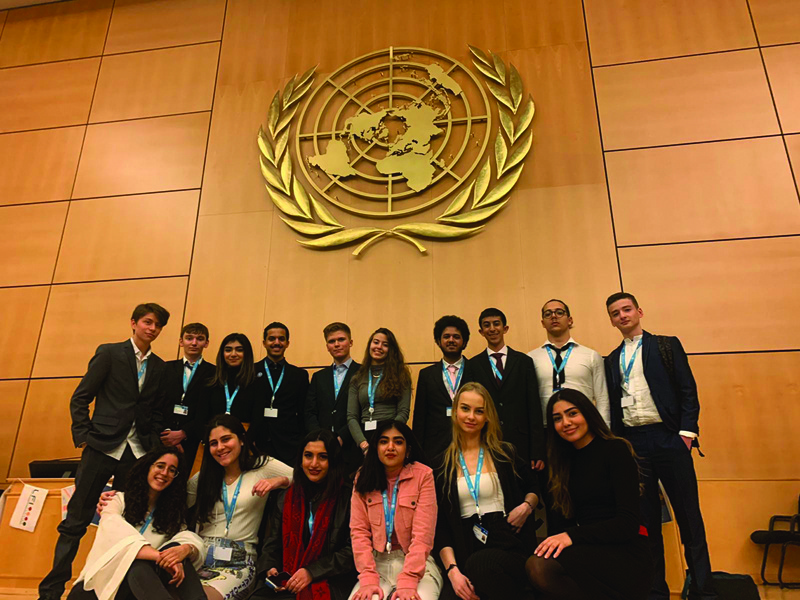
By Faisal Boodai
A pioneer in international unity, the United Nations stands as the only route to resolving issues that plague global society. Through its Model United Nations (MUN) programs, it allows youth to join the global conversation by engaging with current real-world issues, empowering change-making, bridge-building and dream-forging sentiments that will undeniably propel us to a brighter tomorrow.
This year, the American International School of Kuwait was proud to take 16 students from a multitude of nationalities to this prestigious event hosted in Geneva, Switzerland. On Jan 5, eleven grade 12 students (Jawa Al-Wahaib, Rianna Sarbajna, Fatma Al-Attar, Jassem Al-Sanea, David Gadelkarim, Mauricio Landin, Adam Musfi, Beata Romanova, Nouran Abdellatif, Rayanne Berrahmoun and myself), two grade 11 students (Maryam Abdal and Rea Alba Mehra) and three grade 10 students (David Hasler, Marcus Gurney and Reina Abo Chakra), accompanied by our dedicated directors, Rebecca Wyant, Kate Bowler and Adrian Kassissia, journeyed to the epicenter of diplomacy to seize this wonderful opportunity.
Hosted at the United Nations Human Rights Commission Assembly Hall, the opening ceremony emphasized the 75th anniversary of the United Nations and the need now, more than ever, for international cooperation. The combination of excited delegates and thought-provoking speeches was made especially spectacular by the artwork of Spanish artist Miquel Barcelo, whose magnificent creation bedecks the roof of the room. Resembling colorful seafoam, it symbolizes the flowing, constantly moving waves of change that begin in this austere room.
The structure we followed for our three days of the conference was dependent on our roles and committees. Each delegate is paired up with another delegate to represent a specific country (this year we represented Kuwait and France), thus also representing the country's stance on a specific issue. This year, the issues selected were centered around modern technological implications in various contexts. The International Telecommunication Union (ITU) committees, for example, tackled the issue of the negative effects of 5G and how they could be resolved within respective countries.
The role of the delegate is to lobby for resolutions related to specific issues on the first day and debate them amongst their committees on the second and third days. Through debating two resolutions, the committee comes to a final consensus on each resolution, either passing it or rejecting it. At our closing ceremony, we discovered that the resolutions passed would be sent to the actual United Nations to guide future decisions regarding these same issues.
Part of why the concept of MUN works is how it chooses to tackle daunting issues in a uniquely civil and orderly manner that allows all insights to be voiced without fear of hostile response. As our MUN President Rianna Sarbajna puts it, "At first, the nuances of such debate are perceived as tedious, yet as a student exiting their fourth year of MUN, it has taught me valuable lessons in communication, diplomacy and the critical need for cooperation and understanding a society like ours needs".
As the MUN conference is a trilingual program (French, English and Spanish), there are interpreters who are responsible for ensuring that delegates who do not share a common language can communicate in real time during debates, and translators who are tasked with translating resolution documents prior to debates in order for all delegates to access them. This role is integral to the diplomatic debates that are characteristic of the UN.
One of our own interpreters, Mauricio Landin Mestre, explains:"This experience expanded my vocabulary in all languages. I also realized how difficult interpretation is and how important it is to truly master a language." Additionally, members of the press (such as myself) were tasked with reporting on the progress of committees, filming events and interviewing delegates in order to contribute to the MUN magazine at the commencement of the conference.
As we travelled internationally, we wanted to indulge in and learn more about Swiss culture. Thus, in addition to our time at the UN conference, we visited Geneva landmarks, took a day trip to Chamonix, (including Mont Blanc and the Mer de Glace glaciers), and took a tour of the United Nations. We also had our fair share of cheese fondue and Swiss chocolate! A unanimous favorite for us all was ice skating while surrounded by the beauty of European architecture and indulging in hot chocolate in the crisp Swiss air.
Experiences such as MUN are fundamental in today's world, as they empower current youth and future leaders to initiate changes they want to see. MUN prepares youth to engage in and become more educated about the world around them, and thus more poised to take action.










